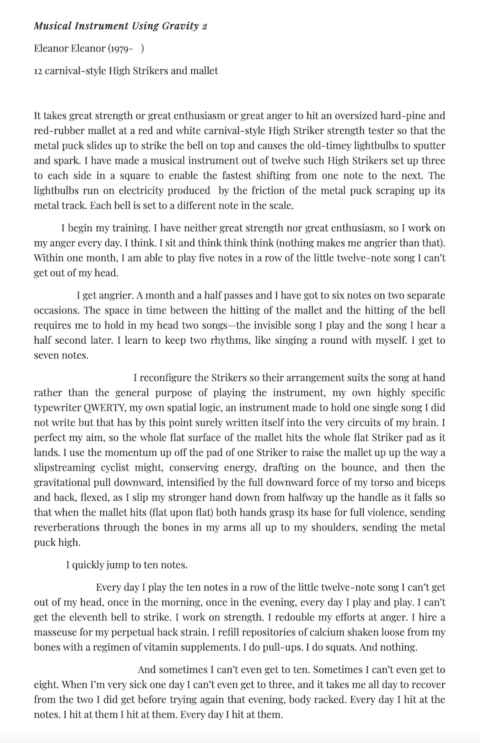Chronological Still Life
Eleanor Eleanor (1979- )
Birds, beasts, flowers, wire, acrylic paint on canvas
The packed petals, thin-velveted and loosed
on the table, pink-streaked, irregularly ridged,
the fish scales half stripped,
the abandoned orange, its split pith,
its visible squeeze and gloss,
the bread knife’s slit, the chipped crust pressed
with mince, the untidy feathers
and pomegranate seeds, the three cheese slabs,
stacked, one colored like a hard salmon side,
one sculpted and lard-like with a soot-cream rind,
one most resembling plain white soap, only soft
with dark green patches like pond bilge,
the already greying oysters,
the slick-surfaced wine glass angling light, look
I want to eat it too,
fast, before it goes, but more than that
I want to paint it —
not the idea of it, hardened into
a version of itself that sits still,
not a stand-in for abundance, or for impending death,
not a rich man’s rich reflected back,
not a play on surfaces, or a trick
to make your eyes make your mouth water, no
I want to paint with
the actual fruit, here on the table,
not a copy but the thing itself —
per Jack Spicer, to make my poems
out of real objects. The lemon to be a lemon the reader
could cut or squeeze or taste. I cut
a cross section of the lemon,
edge it with some yellow paint
and wire it on the canvas.
Onto the seedhole of the cantaloup slice I wire
seed after seed from behind, surface-slopped,
but fairly sturdy, so the pulp stays put
in the ragged green-grey of the patterned rind.
The peony I pound flat like a chicken breast and glue
part to part, petal to sapel to filament,
and the grape bunch, likewise, I burst, like a pregnant
smashed spider, its tendriled leaves curling.
And the purpled onion flower,
and the whole lobster tail.
My still life is pressed and firmly attached to its canvas
by an architectural underbelly so it’s
not two-dimensional exactly, but still
not three, partial, a foot
in each of two rooms. Pause. Then
the fruit flies find it, even in the clean
of the gallery. Then the melted fruit overflows its edge
and the canvas takes on water. Oh,
the cow tongue smells really bad.
Maggots emerge from the goose wing joint,
and spread, breed, and eventually fly off.
The lemon wrinkles and eventually
kinks its neck. Petals go brown and fall,
flaking like pale pink paint.
Various molds mold over time,
various curdlings organize themselves
into soft color groups. Thus
the painting happens
in live chronological order
for a few weeks and months until it fully
stills, finally. Starts to take on dust.
The smells calm. The bugs lose interest.
And the hardening that happens
happens because of time, not because of me. Still,
long after the wine dries into a red film
of itself, I know I could taste it
if I tried. And after all this time, I find
my tongue still perks at what my eyes see,
my art still feels like food, after all this time, I find
I still want to try.
* * * * *
Copy 2
Eleanor Eleanor (1979- )
Undisclosed materials and found materials
I
In the glass display case
I have placed a leaf and
an exact copy of a leaf.
I have not indicated which
is the leaf.
The leaf is an ordinary autumn leaf,
a bit dry, green at its base,
its fingers brushed with yellow and red.
The copy of the leaf is green,
is brushed with yellow and red.
Each is smooth skinned with tiny veins
visible below the surface,
a hole wormed through
and browned on one edge,
with undersides dulled and greener.
I have made the copy of the leaf
out of materials entirely other
than the materials of the leaf and yet
you can’t tell the difference.
II
In the second case, a bag of spilled leaves
and a spilled copy of the bag, identical.
No trace of any glue.
III
In the window looking out of the gallery
are what appear to be two trees in the quad.
One of these trees is a tree,
one is a copy of a tree,
packed inside with a complicated system
of wires and painted metal clasps
so that the copied leaves release to the ground
at exactly the same rate
as leaves on the other tree.
And you stand at the window
staring pointedly at the trees
hoping to catch one in a gesture
too mechanical or too regular,
hoping the leaves will fall
too quickly to the ground
due to some slight difference in weight,
some surface that catches the air differently,
due to the impossibility
of exact duplication,
but they don’t. There is no difference.
There is no difference as far as you can tell.
* * * * *
